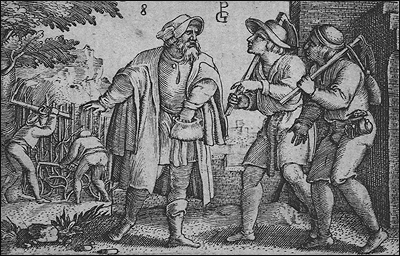
Home > Jesus > Parables of Jesus > Parable of the Two Sons
 Parable of the Two Sons
Parable of the Two Sons
“What do you think? A man had two sons. And he went to the first and said, ‘Son, go and work in the vineyard today.’ 29 And he answered, ‘I will not,’ but afterward he changed his mind and went. 30 And he went to the other son and said the same. And he answered, ‘I go, sir,’ but did not go. 31 Which of the two did the will of his father?” They said, “The first.” Jesus said to them, “Truly, I say to you, the tax collectors and the prostitutes go into the kingdom of God before you. 32 For John came to you in the way of righteousness, and you did not believe him, but the tax collectors and the prostitutes believed him. And even when you saw it, you did not afterward change your minds and believe him.” — Matthew 21:28-32, ESV
This parable is the first in a set of three (the two sons, the wicked tenants, and the wedding feast) addressed to the Pharisees and scribes following Jesus’s triumphal entry into Jerusalem. These are condemnations of the Jewish establishment’s hypocrisy, illustrating their rejection of John the Baptist’s ministry and Jesus as the awaited Messiah. Unique to Matthew, the parable of the two sons contrasts a picture of true repentance and faith with one of false profession and pretense.
The encounter takes place the day after His arrival. Having stayed overnight in the adjacent village of Bethany, Jesus is returning to the city that morning when He feels hungry and approaches a fig tree. Symbolic of Judaism, the tree gives an outward appearance of fruitfulness yet has produced no fruit. The religious leadership in Jerusalem was adorned with all the trappings of obedience and righteousness, yet was spiritually barren. Jesus curses the tree and it withers on the spot.
The chief priests and elders of Jerusalem, who have been indignant at the whole situation concerning Jesus, confront Him when He arrives and demand to know by whose authority He is teaching and healing the people and cleansing the temple. They get no answer, but rather a couple of piercing questions that shine a light on their hypocrisy and force them to play defense.
The first concerns the legitimacy of the baptisms performed by John. Jesus agrees to divulge the source of His authority if they can tell Him if John’s baptisms were by the
authority of God or man. They hesitate to answer either way. If they say the conversions were of God they’re exposed as hypocrites because they discredited and persecuted John, and if they say they’re the work of man John’s followers will riot because they know him to be a true prophet of God. Jesus of course knows this handcuffs them; the question is meant to expose their hypocrisy and unbelief.
The second question He asks is the one posed by the parable—what constitutes real obedience? The first son initially balks at his father’s request to work in the vineyard but later changes his mind and does so. The second feigns obedience but never goes out to do the work. The priests and elders get the answer right when they say the first did his father’s will, but miss the underlying point.
Jesus brands them hypocrites, pointing out that even the social reprobates they despise eventually believed and turned away from their sins in response to John’s ministry. The central message of that ministry was the necessity of repentance, something the religious elites did not think they needed. They instead believed their outward demonstrations of holiness and hypercompliance with the Mosaic Law exceeded what God expected. In actuality they had no true obedience because they had no repentance, and because they had no repentance they will receive no forgiveness. Their deceit reflects that of the second son in the parable, and because of it they will not enter heaven. Meanwhile the prostitutes and publicans who they look down on have turned away from their sins in repentance, and will be welcomed to God’s kingdom.
Evidence of that kingdom was all around the Pharisees. They saw it but didn’t understand, and therefore would not change their minds to believe. John came to them in the way of righteousness, preaching God's truth. That truth is sharper than any two edged sword. It cuts to salvation or destruction, depending on the intentions of the individual heart, and it is our response to the truth of God's word that determines our eternal fate. The gospel divided people back then and still does today. To respond favorably is to respond in obedience. May God help us to consider the intentions of our hearts and embrace His holy promise.
Image:
Pencz, Georg; The Parable of the Father and His Two Sons in the Vineyard, from The Story of Christ; (1534-35)
Scripture Alone • Faith Alone • Grace Alone • Christ Alone • To the Glory of God Alone
Most scripture quotations taken from the New American Standard Bible® (NASB)